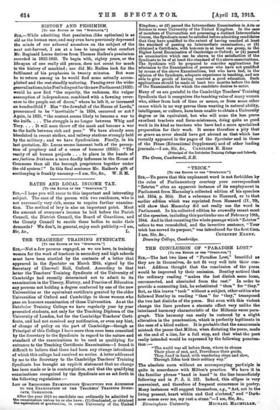HISTORY AND PESSIMISM.
[TO TUE EDITOR OF THE " SPECTATOR.")
Sin,—While admitting that pessimism (like optimism) is as old as the human race, and may even have previously depressed the minds of our arboreal ancestors on the subject of the next nut-harvest, I am at a loss to imagine what comfort Mr. Reginald Lucas derives from Thomas Raikes's pessimism recorded in 1832-1835. To begin with, eighty years, or the life-span of one really old person, does not count for much in the history of mankind ; nor did Mr. Raikes look for the fulfilment of his prophecies in twenty minutes. But were he to return among us he would find some actually accom- plished and the rest steadily maturing. Passing over the wider generalizations,take Peel's disgust for the new Parliament (1833): would he now find "the asperity, the rudeness, the vulgar assumption of independence, combined with a fawning rever- ence to the people out of doors," where he left it, or increased an hundredfold ? Has "the downfall of the House of Lords," pronounced to be "inevitable" in 1834, occurred or not Again, in 1835, "the contest seems likely to become a war to the knife. . . . The struggle is no longer between Whig and Tory. . • It will soon throw off the mask and become a war to the knife between rich and poor." We have already seen bloodshed in recent strikes, and railway stations strongly held by the military ; and we have Syndicalism. Finally, in his last quotation, Mr. Lucas seems innocent both of the percep- tion of prophecy and of a sense of humour (1835): "The vanity of all human projects . . . to place in the bands of one factious Irishman a more deadly influence in the House of Commons than all the borough proprietors together under the old system !" In this final sentence Mr. Raikes's gift of
soothsaying is frankly uncanny.—I am, Sir, W. E. M.










































 Previous page
Previous page